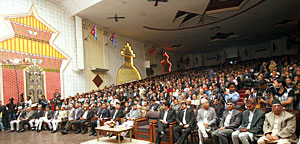 KIRAN PANDAY |
On balance, some of his criticisms are valid but he tends to blame NRN leaders for failing to meet expectations that aren't their own.
Regarding the 'great NRN myths' he sets out to debunk, the first statement, that the diaspora includes some of the best and brightest of Nepal, is certainly not a myth. Prem Jung Thapa is a perfect example. The second myth, that NRNs are indispensable to Nepal, is a misinterpretation of the NRN line that our skills and investment could be a vital part of developing Nepal.
He may have missed the point in trying to discern two different definitions of and courses of action for NRNs. The objective of the movement is to have one seamless NRN 'new' constituency; exhorting their ranks to help Nepal as a patriotic duty is just good marketing. Ultimately, business is business and when any NRN invests in Nepal it should be a business decision. True, some may choose to accept a sub-optimal return because it's Nepal and indeed some already have.
The putdown about the paltry capabilities of NRNs compared to Marwari business houses was plain wrong and also inapt, because there is neither a desire to have our potentials compared nor a demand to have NRN investments considered preferentially.
Furthermore, he ignores the fact that the NRN movement is also about keeping traditions alive so they aren't lost on our children.
Finally, I find it hard to stomach yet another reference to a link between dual citizenship and investment with the implication that investments are being held hostage. It is as if the NRN movement is stealing the crown jewels right under the unwatchful eyes of the Nepali politicians and people. Over the last six years we have laboured mightily to put in place a framework that revises regulations that dictated the treatment of Nepali migrants to other lands, some of which dated back to the middle of the nineteenth century. Prem Jung Thapa may not be aware that even without these in place the NRNA has functioned on faith as an unregistered organisation in Nepal. In this same period, informal estimates indicate that some $300 million in investments were made in Nepal by various NRNs.
A lot of the features of the dual citizenship sought are already enshrined within these revised regulations. There is no demand for voting rights or to be included in the political process and hold office. Neither are there any requests to be treated preferentially as investors and create an unequal playing field. Some of the perceived shortcomings of the current regulations in the areas of entry/exit and property rights would be corrected and I see no shame or reprehensibility in asking for them on the basis of maintaining existing ethnic ties.
Dual citizenship has a certain ring about it and the implication of tying migrants to the motherland. This may yield incalculable benefits without any further major concessions. It is not for nothing that India, China and dozens more countries have chosen this route. The time in Nepal is right since a new constitution is in the making and this is something that could be accommodated. NRNs from the world over need not lecture on the globality of capital markets or the fungible nature of funds. If ethnicity and association with the motherland were not investment criteria why would the NRI and Overseas Chinese have pumped in tens of billions into their respective motherlands, commencing well before these countries took off economically?
In conclusion, there already is a special class of foreigners with Nepali ethnicity scattered across the world. I think we deserve to be recognised as such. It is for Nepal to decide whether to do so. It is our 'patriotic' duty to counsel Nepal to act in her best interests. In my mind this only becomes patriotic if I am a dual citizen.
The author is a founding member, past country representative-USA, Past VP North America and Advisor to NRNA-ICC.
READ ALSO:
Manifesto, amended? by Prem Jung Thapa, FROM ISSUE #473 (23 OCT 2009 - 29 OCT 2009)
The NRN manifesto, by Prem Jung Thapa, FROM ISSUE #471 (09 OCT 2009 - 15 OCT 2009)
Intelligent options, by Biswo Poudel, FROM ISSUE #471 (09 OCT 2009 - 15 OCT 2009)


